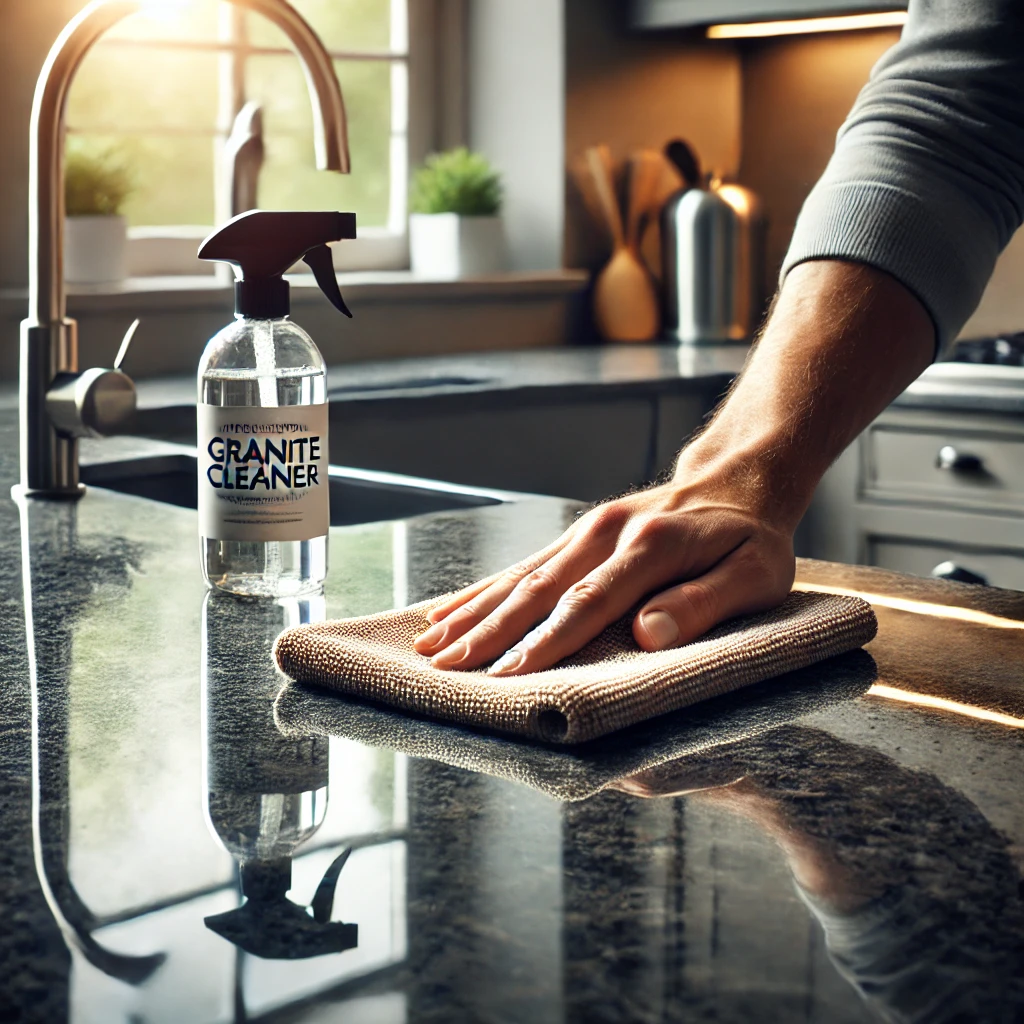
Granite countertops are a timeless addition to any kitchen or bathroom, known for their natural beauty, durability, and ability to elevate a room’s aesthetic. However, maintaining their polished appearance requires more than just wiping them down with any household cleaner. Proper care not only preserves their stunning look but also extends their lifespan, making them a worthwhile investment.
The importance of maintaining granite countertops cannot be overstated. Granite, as a natural stone, is porous, meaning it can absorb liquids and stains if not properly sealed and cared for. Everyday use exposes these surfaces to potential damage from spills, acidic substances, and abrasive cleaners. Neglecting maintenance can lead to dullness, etching, and permanent discoloration, diminishing the countertop’s appeal and value.
Cleaning granite surfaces comes with its challenges. Unlike other countertop materials, granite requires a delicate balance of thorough cleaning and gentle care. Many common household cleaners contain harsh chemicals that can degrade the sealant or etch the stone, while improper cleaning techniques may cause scratches or streaks. Understanding what to use—and what to avoid is critical to keeping granite countertops looking their best.
We will guide you through the essential steps for cleaning granite countertops effectively. From understanding what makes granite unique to learning the safest cleaning methods, this guide will provide practical tips and techniques to maintain the beauty and functionality of your granite surfaces for years to come. Along the way, we’ll address common mistakes, recommend the right tools and products, and explain how to tackle stubborn stains and resealing when necessary.
By the end of this article, you’ll have all the knowledge needed to confidently care for your granite countertops, ensuring they remain a stunning centerpiece in your home.
Understanding Granite Countertops
Granite is a natural stone formed from cooled molten rock, giving it a unique blend of beauty and resilience. Its rich patterns and color variations result from mineral deposits, making each slab one-of-a-kind. This combination of aesthetic appeal and strength has made granite a popular choice for countertops.
However, granite’s natural composition also demands special care. The stone is porous, meaning it has tiny holes and capillaries that can absorb liquids and stains. This property makes it vulnerable to damage if not properly sealed and maintained. Furthermore, granite’s polished surface, while durable, can lose its luster over time due to improper cleaning or neglect.
Proper maintenance of granite countertops offers numerous benefits. Regular care not only enhances their appearance but also prevents long-term damage. A well-maintained granite surface resists stains, scratches, and dullness, retaining its shine and elegance for years. Additionally, proper care ensures that the countertop remains hygienic and safe for food preparation, as cleaning the sealed surface prevents bacteria from settling into the stone’s pores.
What Not to Use on Granite Countertops
Using the wrong cleaning products on granite can cause irreversible damage. Acidic cleaners, such as vinegar, lemon juice, or products containing bleach, can erode the sealant and etch the surface, leaving it dull and vulnerable to stains. Abrasive cleaners, including scouring powders or pads, can scratch the polished finish, diminishing its appeal.
Avoid any product labeled as “all-purpose” unless it specifically states it is safe for natural stone. Additionally, steer clear of ammonia-based cleaners, as these can degrade the sealant over time.
Sealing plays a critical role in protecting granite countertops. A quality sealant creates a barrier that prevents liquids, oils, and stains from penetrating the stone. Without this protective layer, granite’s porous nature makes it highly susceptible to damage. Regularly checking and resealing your countertops as needed ensures they remain resilient against daily wear and tear.
Essential Supplies for Cleaning Granite
To care for granite countertops effectively, you’ll need the right tools and cleaning products. Essential supplies include:
- A soft microfiber cloth for daily cleaning.
- A pH-neutral granite cleaner or mild dish soap.
- A non-abrasive sponge for tackling tougher spots.
- A stone-safe polish for restoring shine.
- A resealing product to maintain protection.
For those who prefer a DIY approach, a simple cleaning solution can be made by mixing a few drops of mild dish soap with warm water. This gentle mixture is safe for granite and effective at removing everyday dirt and grime.
Step-by-Step Guide to Cleaning Granite Countertops
Daily Cleaning
- Wipe down the countertop with a damp microfiber cloth to remove crumbs and dust.
- Apply a small amount of mild dish soap to the cloth and gently clean the surface.
- Rinse the cloth and wipe again to remove any soap residue.
- Dry the surface with a clean, dry microfiber cloth to prevent water spots.
Deep Cleaning
- For stains, create a paste using baking soda and water. Apply it to the stain and let it sit for several hours or overnight.
- Wipe away the paste with a damp cloth and dry the area thoroughly.
- Use a granite-safe polish to restore shine and enhance the stone’s appearance.
How to Remove Stubborn Stains
Granite can occasionally fall victim to stubborn stains, which vary depending on the source.
- Oil stains: Use a baking soda and water poultice.
- Water stains: Gently buff the area with a soft cloth and polish.
- Organic stains: Apply a hydrogen peroxide and baking soda paste.
For deep stains, a poultice is highly effective. Spread the paste over the stain, cover it with plastic wrap, and let it sit for 24-48 hours. This process draws the stain out of the stone, restoring its natural look.
Sealing Granite Countertops
Sealing granite countertops is essential for their protection. To check if your countertop needs resealing, perform a water test: drop water on the surface and observe. If the water beads, the seal is intact; if it absorbs, resealing is necessary.
Resealing Steps
- Clean the countertop thoroughly.
- Apply the sealant evenly using a clean cloth or applicator.
- Let it sit for the recommended time, then wipe off excess.
- Buff the surface to ensure an even finish.
Granite Countertop Maintenance Tips
Preventive care helps keep granite looking new. Use trivets for hot pans and coasters for drinks to avoid scratches and stains. Always use cutting boards instead of cutting directly on the granite. Establish a resealing routine based on usage, typically every 1-2 years, to maintain its protection.
Read more: How to Clean Soap Scum and Residue
Conclusion
Granite countertops are a beautiful and durable addition to any home, but they require proper care to maintain their elegance and functionality. By using the right cleaning methods, avoiding harmful products, and performing routine maintenance, you can ensure your countertops remain stunning for years to come. With these tips, your granite surfaces will continue to be a source of pride in your home.
